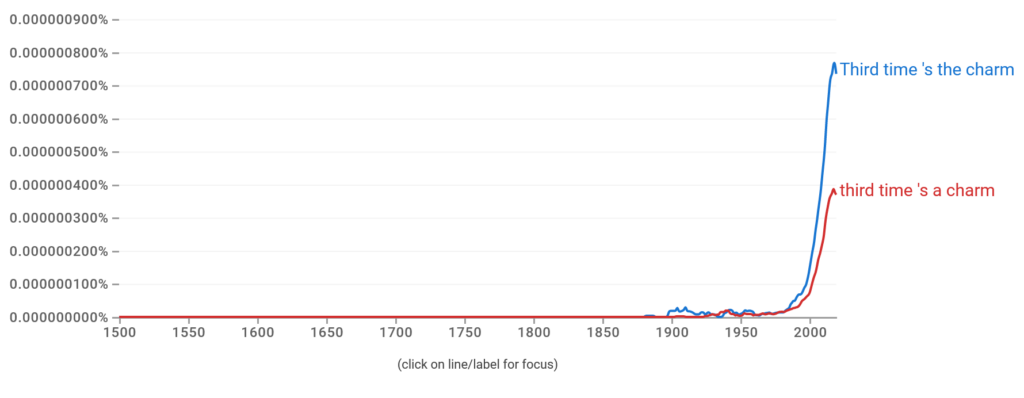Third time’s a charm means that something will succeed or turn out well on the third attempt after two previous unsuccessful tries. With roots dating back to antiquity, this idiom serves as a source of motivation and empowerment.
Idioms like third time’s a charm are figurative uses of words that often relate back to a literal definition in a metaphorical or symbolic manner. They are popular in all languages as they add detail and description to help clarify an author’s message. Learning them can help you master the English language.
In this article, we’ll explore the idiom third time’s a charm in depth, uncovering its meaning, origin, variations, and usage in various contexts. Keep reading to discover more about this idiom, and test your understanding with a quiz at the end.

What Does the Idiom Third Time’s a Charm Mean?
The idiom third time’s a charm suggests that success or favorable outcomes are more likely to occur on the third attempt, following two previous unsuccessful efforts.
Merriam-Webster explains that the idiom is “used to say that two efforts at something have already failed, but perhaps the third will be successful.”
A more cynical perspective might attribute success on the third attempt to the lessons learned from the initial two failures. It can also serve as a form of encouragement before embarking on the third try at something.
For example, I recently introduced a research technique in my class that frustrated the students’ efforts to rush through the work and miss vital information. After each attempt, I returned their work with a list of missing materials to allow them to see where they were falling short.
Evidently, the third attempt was the charm as they improved after each feedback session to the point that they had mastered the skill by their third try.
Variations of the Idiom
Here are a few variations of the same idiom, often modified to fit the context or to add flavor:
- The third time is the charm
- The third time’s the charm
- Third time lucky (British)
- Third time brings success
- Three attempts lead to triumph
How Is the Idiom Third Time’s a Charm Commonly Used in Context?
To properly use the expression third time’s a charm, you’ll likely prefer seeing how the idiom works in context. Look at the different ways you can take advantage of this phrase in your material below.
What Are the Different Ways to Use the Idiom Third Time’s a Charm?
- Personal motivation: Use the phrase to encourage yourself or others to persist and try again after previous failures or setbacks. “You’ve tried twice already, so keep going. The saying goes, ‘Third time’s a charm.’”
- Optimism and hope: Employ the expression to express optimism and hope that things will work out positively in the end. “I believe that the third time is a charm. We’ll get it right this time.”
- Reassurance and encouragement: Use the phrase to reassure someone who may be feeling discouraged or frustrated with previous failures. “I know you’ve been struggling, but don’t worry, the third time is the charm.”
- Reflecting on past experiences: Use the phrase when discussing past experiences where success was achieved on the third attempt. “I failed twice before finally succeeding. You know what they say, third time’s a charm.”
Where Can You Find Examples of the Idiom Third Time’s the Charm?
Examples of the phrase third time’s the charm can be found in various contexts, including:
- Literature and poetry
- Movies and TV shows
- Personal stories and anecdotes
- Inspirational quotes and sayings
- Proverbs and cultural references
- Online sources and social media
The expression has long been used to symbolize luck in the third attempt and is often referenced in athletics as well—as seen in these articles:
“Our goal is third time’s the charm, but it’s one game at a time.” (The Journal Gazette)
Hopefully, the third time’s the charm, and this go-around will have more staying power than the last. (The Shepherd Express)
What Are Some Tips for Using the Idiom Third Time’s a Charm Effectively?
- Contextual relevance: Ensure that the usage of the idiom is appropriate for the context in which you are using it.
- Personal anecdotes: Share personal stories or anecdotes where the phrase applies, emphasizing the challenges faced before achieving success on the third attempt.
- Optimistic tone: Use the phrase to convey a sense of optimism and hope.
- Motivational messaging: Employ the expression to motivate and encourage yourself or others to keep trying and not give up, highlighting the idea that success is more likely to be attained on the third attempt.
- Narrative structure: Mention the first and second attempts, establishing a pattern that culminates in success on the third try.
- Varied language: While third time’s a charm is a well-known phrase, consider using alternative expressions or variations to convey the same idea.
What Is the Origin of the Idiom Third Time’s the Charm?

The idiom third time’s the charm has its roots in the ancient belief that the number three is magical, but the phrase was first used in the early 1800s. Even the Greek philosopher Pythagoras noted its use, and we can see it in truth-seeking as well as in the passage of time.
It is highly sought after to create balance in works of art and drama, such as in Mozart’s Magic Flute or Shakespeare’s Macbeth, in which three witches foretell the damnation of the main character. The number is also considered the number of the divine in Christianity.
One of the first published instances of the expression relates to a variation found within Kelly’s
The Scottish Proverbs Collected, Explain’d and Made Intelligible to the English published in 1721: All things thrive at thrice.
How Did the Idiom Evolve Over Time?
Over time, it’s been used widely in various contexts to express the optimistic belief that an endeavor or attempt will succeed on the third try. Regardless of whether it’s a sports game or a difficult task at work, this idiom now serves as a form of encouragement, suggesting that perseverance often leads to success.
What Are Some Related Terms to Third Time’s a Charm?
Take a look at the terms related to the expression to help you determine where it will best fit into your own material.

Synonyms
- Try, try, and try again
- Persistence pays off
- If at first you don’t succeed, try, try again
- Three times lucky
Antonyms
- The first time’s the charm
- One and done
- Beginner’s luck
- Instant success
- Immediate triumph
- One-shot wonder
Third Time’s the Charm: Test Your Knowledge!
Choose the correct answer.
Let’s Review
The idea behind third time’s a charm carries a powerful message of perseverance, resilience, and the belief in the significance of multiple attempts. It embodies the idea that success is more likely to be achieved after multiple tries, emphasizing the importance of not giving up in the face of initial failures.
Use the expression to instill optimism and motivation in your messages through its use, and remember to utilize the tips and examples provided above to help you understand where it belongs. By now, you should have recognized where and how to use it, what alternative expressions exist, and where it originated from.
If you enjoyed this one, we have hundreds of idiom guides right here on our site to help you expand your English language skills and become a better communicator.
Check out some others we covered:
